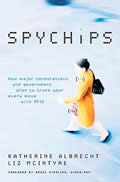Other
McIntyre
Articles:
RFID Vulnerable to Virus Attacks
AMERICAN EAGLE OUTFITTERS DENIES RFID USE
By Liz McIntyre & Katherine Albrecht
August
10, 2006
NewsWithViews.com
Crisis PR Firm Disavows Incriminating Video on Eve of Major Conference
On the eve of a major RFID apparel and footwear conference, privacy activists are asking questions about an Orwellian industry video presentation depicting the use of Radio Frequency Identification at an American Eagle Outfitters store. The animated video, created by technology integrator CompEx Inc., depicts how a retailer could embed the controversial technology into clothing and credit cards to secretly identify and track consumers--even deliver targeted marketing messages.
"American Eagle Outfitters has assured us that it is not using RFID in its stores or operations, and we applaud them for that. But consumers need to know that this technology exists and what it could mean for them. We have documentation showing that other companies are looking closely at these types of invasive applications," said Liz McIntyre and Katherine Albrecht, co-authors of "Spychips: How Major Corporations and Government Plan to Track Your Every Move with RFID."
The video shows a consumer walking into an American Eagle Outfitters store, being remotely identified through the American Eagle Outfitters credit card in his pocket, and purchasing items with RFID tags hidden in the store's branded clothing. The graphic footage concludes with a full-facial biometric scan conducted through a pinhole camera at checkout.
The animated flash clip is posted on the authors' website.
Although the footage was created in 2002, its disclosure yesterday had an immediate impact on senior management at American Eagle Outfitters. McIntyre says that within minutes of sending the video clip to an executive at American Eagle, she received a call from Ed Nebb, senior director of investor relations and crisis communications at Berns Communications Group. He issued the following statement:
"American Eagle currently does not use any RFID systems, either in supply chain management, consumer credit card or loyalty programs, or anywhere else within our operations. We highly value and respect our customers' privacy. The fact that a vendor may have offered a system demonstration should not be interpreted as an intention on our part to adopt such a system in the future."
CompEx Inc. President Aram Kovach, who developed the video, told McIntyre that American Eagle Outfitters had requested the RFID demonstration. "They asked us to come out," he said, explaining that the executives later traveled to Kovach's office in Ohio to see a working prototype.
The RFID tracking capability depicted in the video is feasible. "It worked," Kovach said. "All of these things can be done." But he noted that the cost of the tags was a big barrier to adoption.
McIntyre and Albrecht worry that companies deterred by cost issues may be reviving such plans now that the price of tags has dropped below the $.08-cent range.
They point to the RFID Apparel and Footwear Conference to be held at New York's Fashion Institute of Technology next week as a reason for concern. The event, co-sponsored by RFID Journal and the American Apparel and Footwear Association, promises "to show you how RFID can uniquely benefit the apparel and footwear industry." However, unlike past RFID events, where members of the press were welcomed, the promotional literature for the conference states:
"The entire conference is off limits to the press, so you can be sure you'll get candid insider insight that you can't hear anywhere else."
"It's clear that implementing RFID in apparel and footwear is being discussed behind closed doors," said Albrecht. "Our concern is that the companies working to integrate RFID into clothing operations are keeping their plans from the public. A case in point is Levi Strauss, which is selling clothes with RFID hang tags attached, but refusing to disclose the test location."
The pair is asking the conference sponsors to explain the need for secrecy at their event. "What is it they're discussing that they don't want the press to know?" Albrecht asks. "The press restriction is obviously not designed to keep proprietary information from industry competitors, since any apparel or footwear company can attend the event at a discounted rate. Clearly, excluding the press is an attempt to prevent the public from learning about the industry's plans to use RFID tracking devices in clothing."
Albrecht and McIntyre have posted a promotional email for the conference that specifies the press restriction at: [Read]
� 2006 - Liz McIntyre & Katherine Albrecht - All Rights Reserved
Sign Up For Free E-Mail Alerts
E-Mails are used strictly for NWVs alerts, not for sale
Liz McIntyre is a consumer privacy expert and author of Spychips: How Major Corporations and Government Plan to Track your Every Move with RFID. In this explosive book, McIntyre and co-author Katherine Albrecht reveal how organizations like Procter & Gamble, Gillette, Wal-Mart, and even the U.S. Postal Service plan to use tiny computer chips smaller than a grain of sand to track everyday objects-and even people-keeping tabs on everything you own and everywhere you go.
Katherine Albrecht is a privacy advocate and co-author of Spychips: How Major Corporations and Government Plan to Track your Every Move with RFID. Albrecht has testified on RFID technology before the Federal Trade Commission, the California state legislature, the European Commission, and the Federal Reserve Bank, and she has given over a thousand television, radio and print interviews to news outlets all over the world. Her efforts have been featured on CNN, NPR, the CBS Evening News, Business Week, and the London Times, to name just a few.
Web Sites: SpyChips.com and NoCards.org
E-Mail: liz@spychips.com
McIntyre and Albrecht worry that companies deterred by cost issues may
be reviving such plans now that the price of tags has dropped below the
$.08-cent range.














